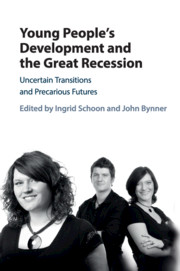Book contents
- Frontmatter
- Contents
- List of Figures
- List of Tables
- Contributors
- Acknowledgments
- Preface
- List of Abbreviations
- Part I Introduction
- Part II The Changing Context of Youth Transitions
- Part III Variations in Education and Employment Transitions during Times of Economic Hardship
- 5 Young People's Experiences of Employment and Unemployment across Europe: Evidence from the EU- SILC
- 6 Structural Advantages, Personal Capacities, and Young Adult Functioning during the Great Recession
- 7 The Vanishing Teenage Worker in the United States
- 8 Education and Employment Transitions in Germany before and after the Financial Crisis
- 9 Labor Market Entry in Germany before and after the Financial Crisis: An Analysis of Duration of Labor Market Entry, Quality of First Job, and Fixed- Term Employment
- Part IV The Impact of the Great Recession on Families
- Part V Future Orientations and Well-being
- Part VI Conclusion
- Index
- References
6 - Structural Advantages, Personal Capacities, and Young Adult Functioning during the Great Recession
from Part III - Variations in Education and Employment Transitions during Times of Economic Hardship
Published online by Cambridge University Press: 20 October 2017
- Frontmatter
- Contents
- List of Figures
- List of Tables
- Contributors
- Acknowledgments
- Preface
- List of Abbreviations
- Part I Introduction
- Part II The Changing Context of Youth Transitions
- Part III Variations in Education and Employment Transitions during Times of Economic Hardship
- 5 Young People's Experiences of Employment and Unemployment across Europe: Evidence from the EU- SILC
- 6 Structural Advantages, Personal Capacities, and Young Adult Functioning during the Great Recession
- 7 The Vanishing Teenage Worker in the United States
- 8 Education and Employment Transitions in Germany before and after the Financial Crisis
- 9 Labor Market Entry in Germany before and after the Financial Crisis: An Analysis of Duration of Labor Market Entry, Quality of First Job, and Fixed- Term Employment
- Part IV The Impact of the Great Recession on Families
- Part V Future Orientations and Well-being
- Part VI Conclusion
- Index
- References
Summary
Abstract
Past research has demonstrated that severe economic downturns can have a major impact on the life course, and the Great Recession is unlikely to be an exception. Of particular interest is the potential for the Great Recession to reshape a period of the life course that is the focus of a great deal of discussion and concern: the transition into adulthood. Here, we draw on life course theory to describe the ways in which the assumption of various work, educational, and family roles in the late teens and early twenties may have been sped up or slowed down by the Great Recession and how these apparent recession effects may have varied according to the family backgrounds and psychological/behavioral capacities of young adults. Historical comparisons of multiple cohorts (2004, 2006, 2008, 2010) of US young adults who participated in the National Longitudinal Survey of Youth – Young Adult cohort revealed some evidence that transitioning into adulthood during the Great Recession slowed down school enrollment, labor force entry, partnering, and becoming a parent among 18–25-year-olds. The prevalence of these statuses was often especially low in the supposed recovery year of 2010, and school enrollment was the least affected status. This slow-down was more age group-specific for family roles. Variation in these cohort trends by family background and psychological/behavioral factors was minimal, although some evidence suggested that a history of high academic achievement may have done more to delay family transitions among teenagers during the Great Recession. Comparisons with historical trends in young adult statuses in Brazil, Mexico, and South Korea provide useful context for these US patterns.
Introduction
Today, media stories about the possibility of a “lost generation” reflect fears about youth coming of age during the Great Recession, particularly young people in their late teens and early twenties who are trying to find a foothold in adulthood in a time of foreclosed opportunity (Grusky, Western, and Wimer 2012). These fears are certainly not unfounded, given past research showing that young adults are vulnerable during economic downturns because they are too old to be protected from the reality of what is happening and too young to have already secured foundational school and work experiences.
- Type
- Chapter
- Information
- Young People's Development and the Great RecessionUncertain Transitions and Precarious Futures, pp. 129 - 153Publisher: Cambridge University PressPrint publication year: 2017
References
- 3
- Cited by



